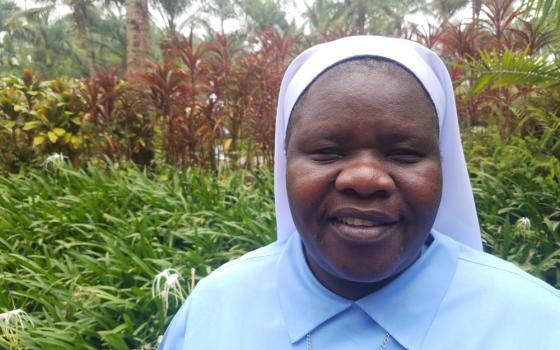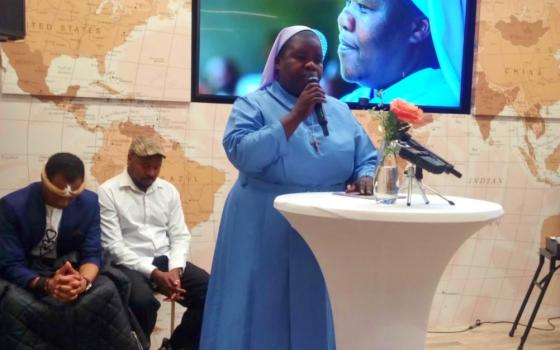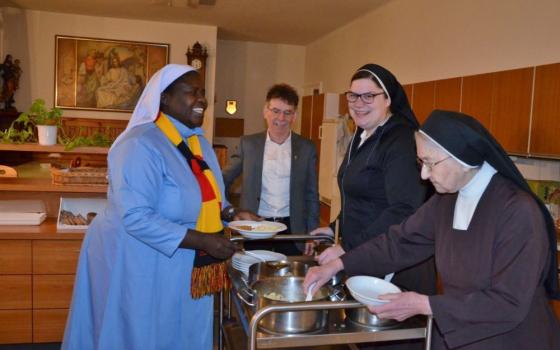Sr. Hellen Lamunu is the project coordinator of Little Sisters of Mary Immaculate Centre for Disadvantaged Children in Gulu, Uganda, which provides shelter, schooling and vocational training for vulnerable children and young people in an area of northern Uganda.
That region is recovering from more than 20 years of armed conflict because of an insurgency by the Lord's Resistance Army (LRA), a rebel group that the human rights advocacy organization the Enough Project calls "one of central Africa's cruelest and most enduring armed groups over the past 30 years. The LRA has abducted over 67,000 youth, including 30,000 children, for use as child soldiers, sex slaves, and porters, and has brutalized communities since its inception in 1987."
The conflict has since spread to other parts of Uganda, as well as to South Sudan, the Democratic Republic of the Congo and the Central African Republic.
As a result of the insurgency, there are many children in Gulu who have been orphaned, physically and mentally disabled, and forced to live on the streets. Since 2004, Little Sisters of Mary Immaculate Centre for Disadvantaged Children has helped nearly 700 people.
Aside from the direct work of assisting children, the center also "sensitizes communities" and "provides trauma healing" for those affected by war, including family members of the children and former and current soldiers.
Many of those the center assists are former child soldiers, and Lamunu is an advocate for assisting them and trying to reintegrate them into society. She regularly appears at conferences in Africa and in Europe. In February, she spoke of her experiences and her work in Vienna, attending a conference by Missio Austria, a branch of an international network of Pontifical Mission Societies.
In December, Lamunu participated at a convening near Kampala, Uganda, of sisters from East Africa sponsored by the Conrad N. Hilton Foundation, which also funds Global Sisters Report. There, Lamunu spoke not only of her work but her own experiences in being abducted for two weeks in September 1994 by the Lord's Resistance Army.
Lamunu spoke to GSR during the Uganda convening about her experiences and how they undergird her work on behalf of children. In subsequent follow-up questions via email, Lamunu spoke of experiencing two other threatening incidences, one in October 1988 and another in April 1989. She said of the three, the one she spoke about at the Uganda meeting was the worst.
GSR: You spoke publicly about your experiences. If you don't mind reliving the experiences, could you tell us about what happened?
Lamunu: In 1988, I was a 19-year-old novice. The LRA came shooting everywhere in the convent when we were asleep. The novice mistress told us to run to the nearby church, where the rebels later found us and demanded we carry out plates, blankets and bed sheets to them. A year later, the same thing happened: We ran into the church, and they told us to come out again. We carried looted items out to them and returned to the convent. We witnessed torture, looting and beatings by rebels.
The worst happened in September 1994. I was abducted for two weeks. I was taking a taxi to my village in northern Uganda, and we entered an ambush. This was an area where a lot of activity was going on. I knew of people killed along the road, of women being raped. When it was clear we were in trouble, the driver abandoned the car while it was still going, and I was injured in the crash that followed. My leg was hurt; the rebels came, and I shouted to them, "My brothers, please help me." So they took me in custody.
It was not an easy experience. Though I recovered from the injury, it was rainy season, and I was forced to sleep on leaves on the ground. I knew if I was killed in the bush, which is where we were, animals would eventually find and eat my body.
In that kind of environment, you pray a lot. I was constantly praying, "I'm in your hands, and I commend to you my spirit." I also prayed all of the rosaries I could pray. I came to realize there was nothing I could do except pray. I said to myself, "I'm ready for anything." An LRA commander eventually released me.
What did you witness in those two weeks?
I screamed loudly when I saw people about to be killed by the soldiers. They would stop what they were doing, and as this kept up, they told me that I was wasting their time, which is probably why I was eventually released. In that respect, it was helpful to be a sister. They gave me food, and several of the soldiers told me, "I was once an altar boy." It also helped that aside from my screaming to stop killings, I remained calm. That helped save me.
The Lord's Resistance Army calls itself Christian, and one of the rebel commanders was "preaching" from the Bible. But what they were doing was clearly contrary to the spirit of the Bible: not only killing people, of course, but stealing animals like goats and chickens from farmers whose land they would take over.
There were so many other indignities. The place I was at had no water, and people were forced to drink their own urine. I did not do that.
How does your own experience impact how you assist those who were both abductors and those, like yourself, who were abducted?
Many of those doing the abductions were themselves abducted when they were younger and then trained to commit crimes themselves. They were forced to do that. So I stress that common ground, that we were both abducted. I know what they went through. I tell them that from my own experience, you have to recall to confront traumas, that you experience terrible things but that they don't define you. You will always find a room, a home with God. God will always follow you, direct you to a new place.
So you believe in the power of forgiveness.
Yes. I've seen and experienced the power of forgiveness. In my own experience, I've forgiven those who abducted me. If I could not forgive them, I would not work with the soldiers like I do now. We work with them in order that they can have a better life. If my ministry has a theme, it is, "to heal the wound." They have such big psychic wounds, and we try our best to heal those wounds through counseling, trauma healing, conflict management.
I tell people that whatever happened, it is not the end of your life, that you can begin life again. I always talk about forgiveness and reconciliation for one another.
Is it safe to say your own ministry stems from your own experiences? And how have you dealt with your own trauma?
It's a confluence of events in my life, yes, and that's had an impact of what I do in my ministry.
You have to confront the trauma, but you cannot stay there, stuck in the past, so that you're constantly dwelling on an act of many years ago. Staying idle is not good. I would say that prayer — a lot of prayer — helps, and so does fellowship with fellow sisters. Time for reflection is important, realizing that the wonder of God is always possible.
It is difficult to come out of a traumatic experience, but when you do get out of it, you realize that it's because of the hand of God. From these experiences, I learned that with God, everything is possible.
[Chris Herlinger is GSR international correspondent. His email address is cherlinger@ncronline.org.]



